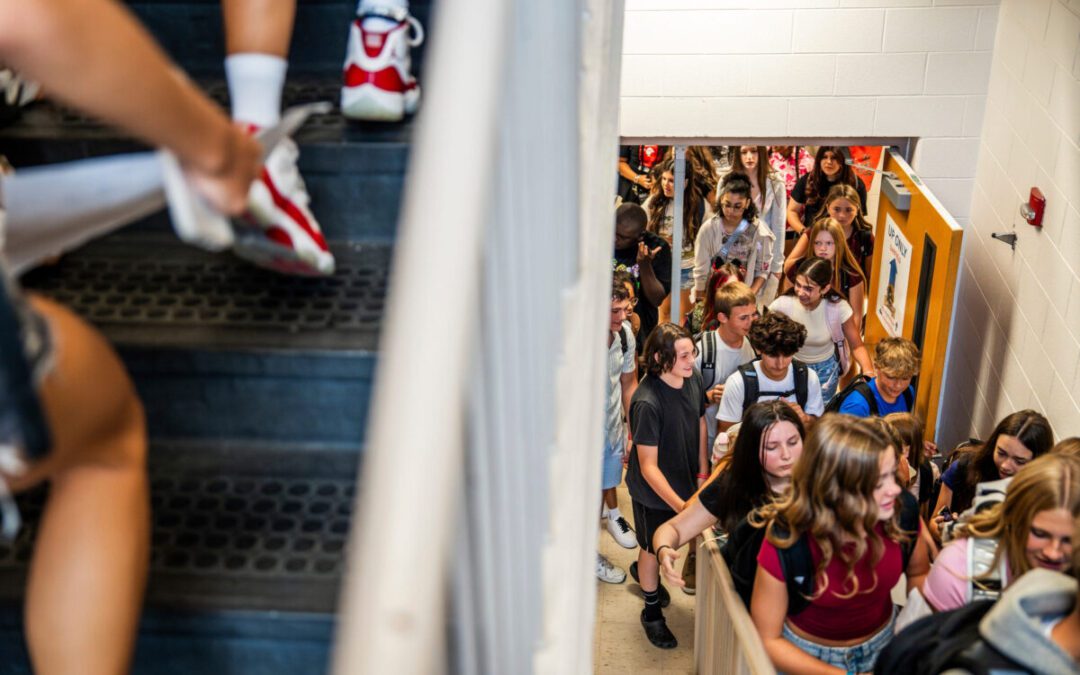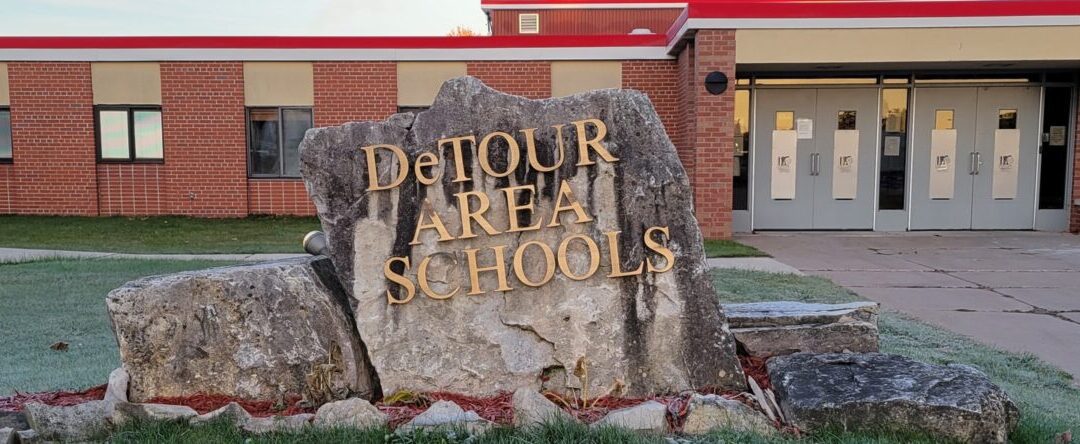
Photo Illustration/Jabin Botsford/The Washington Post via Getty Images
Republican state lawmakers are pushing dozens of new bills that aim to make changes at Michigan’s public schools—but many of them are unlikely to make their way into law.
LANSING—Michigan’s schools are dealing with some issues. Reading scores are slipping, teacher shortages are still widespread, and parents have long demanded more oversight over what their students are taught, as well as more accountability for when schools fall behind.
Now, with partial control of state government, Michigan Republicans have introduced a slew of education-related bills they contend will improve student outcomes and cut red tape. Some of them have gained bipartisan support. But critics warn that a few of them could make things worse—and they still face little chance of passing in the Democratic-controlled state Senate.
Here’s a breakdown of what Michigan Republicans have proposed, how those ideas are being received among state education leaders, and what—if anything—might actually become law.
Loosening the Rules or Lower the Bar?
One Republican-led bill that’s now en route to the state Senate would allow local school districts to issue their own teaching certificates—no state certification required—for up to five years.
That would mean anyone with a bachelor’s degree in a subject area could start teaching it in K-12 schools, bypassing Michigan’s traditional credentialing process in a change that’s meant to help quell teacher shortages that have plagued the state for years, particularly in rural areas.
Under the bill, these newly licensed teachers wouldn’t be able to teach special education. And the ability to issue local teaching certificates would also end altogether in 2035—meaning that the new teachers would need to get a state-issued certificate to keep teaching in the state.
Officials at the state Department of Education have since voiced opposition to the bill—arguing that it would weaken the quality of instruction, especially for students in underserved districts.
And some education advocates have also voiced concerns about how the newly licensed teachers could lack effective teaching skills, as well as classroom experience. Currently, all new teachers must be supervised by another teacher for their first three years in the classroom. House Bill 4153 would exempt locally licensed teachers from this requirement altogether.
“It’s great that they have subject level mastery, but where are they also mastering their teaching skills?” Rachelle Crow-Hercher, director of the Michigan Education Justice Coalition, told Bridge Michigan. “That’s important to me that I know that my kids’ teachers have mastered teaching.”
The Republican-led legislation has since been referred to the Senate Education Committee, where it has not yet been scheduled for a hearing.
A related bill to waive teacher certification fees also passed in the state House with bipartisan support, namely to help reduce financial barriers for aspiring teachers across Michigan.
But without those revenues, the state could lose out on about $8 million annually—about half of which is dedicated to an office that administers teacher training programs, Bridge reports. Records show the Michigan Department of Education has also voiced opposition to that bill.
Curriculum Quality or Culture War?
In February, Republicans also introduced legislation that would require the Michigan Department of Education to publish a list of recommended curricula and testing providers for schools.
Under the bill, schools wouldn’t be forced to use the list. But it could set the stage for more centralized curriculum standards—and potential political interference—by requiring all posted curricula to “align with the state’s academic standards,” as outlined in the Revised School Code.
House Speaker Matt Hall has said the legislation, which has since advanced from a House committee, is about raising the bar for students and moving away from unvetted lesson plans.
But national education advocates, including the National Education Association, have warned that even non-mandatory, “recommended” lists can pressure school districts to conform— especially if future funding or assessments are tied to whether those curricula are used.
The Michigan Department of Education itself emphasizes that state academic standards in the Revised School Code are only designed to guide—not dictate—local curriculum decisions. Schools, instead, are encouraged to tailor materials based on their students and communities.
Under the bill, the first list of curricula would have to be published on the state Department of Education website no later than April 1, 2026, and then updated by April 1 annually. The legislation has advanced from a state House committee and is headed for a full floor vote.
More Data for Parents or More Red Tape for Schools?
Another Republican-led bill advancing in the state House would require all public school districts in Michigan to post a direct link to the state’s school data dashboard on their websites, as well as send out annual reports to families about test scores, attendance rates, and graduation data.
Republicans say the changes will keep parents informed, as well as empower them to hold schools accountable when they fall behind. The bill, which mirrors some of the other reporting requirements proposed by Gov. Gretchen Whitmer this year, has received bipartisan support.
But some education researchers caution that added reporting requirements—without added support—can place extra burdens on already under-resourced schools, and may distract from addressing deeper issues like poverty, understaffing, and outdated infrastructure.
For new accountability systems to be effective, they must go beyond mere data reporting, according to the Center for Assessment. Their research suggests states should design systems that not only report data, but also use it to inform local improvement efforts—ensuring the effort leads to meaningful support for schools rather than just adding to their reporting obligations.
A Power Grab or a Governance Fix?
Republicans have also introduced plans to amend the state Constitution to allow the governor to appoint the state superintendent, rather than the elected Michigan State Board of Education.
Under House Resolution E, all future state superintendents appointed after Jan. 1, 2027 would be picked by the governor (with advice and consent of the state Senate) for a four-year term.
In short, that would mean the state superintendent—who serves as the top executive at the Michigan Department of Education and advises the governor and state legislature on all things education—would answer directly to the governor instead of an eight-member state board.
“By adopting this resolution and having a superintendent who was appointed by the governor, who is elected by the people, we can restore some form of accountability to that department,” sponsoring state Rep. Bill G. Schuette (R-Midland) said during a hearing on the bill last month.
The proposal appears to have bipartisan support, though it has yet to clear either chamber.
Former Republican gubernatorial nominee Tudor Dixon voiced support for the change on the campaign trail in 2022. A bipartisan council created by Whitmer also supported the change in how the state superintendent is selected as a way to help streamline decision-making.
But the eight-member State Board of Education, as well as some Democratic lawmakers, are worried the change could lead to short-term, politically motivated decisions and less oversight.
“You’re setting up a system in which you’ll have a Republican governor appointing someone, and then a few years later, a Democratic governor, and the constant push and pull would be detrimental for outcomes,” state Rep. Regina Weiss (D-Oak Park) said during a committee hearing on the bill last month. “Constant change is not good when it comes to education.”
Unlike the other education-related bills, this proposal would require two-thirds support in both the House and Senate—namely because it would ask voters to amend the state Constitution.
House Bill 4148 also seeks to restructure the State Board of Education by dividing Michigan into four geographic districts, requiring political parties to nominate board candidates from different parts of the state on a rotating basis. Supporters say the change would give rural and northern communities a stronger voice in deciding statewide policies for the state’s public schools.
Other Proposals
As the House returns to session from spring recess this week, Republican leaders are reportedly planning to vote on a number of other education policies—as well as hash out plans to lower crowded class sizes in Michigan’s schools, according to the Detroit News.
Other Republican-led legislation aims to test students multiple times throughout the school year to help benchmark their progress over time, update and modernize school curricula, expand the classes students can take to meet graduation requirements, and expand high school dual enrollment to include trade schools, according to reports from Michigan Advance.
House Bill 4141 would also sharply restrict students from using cell phones on school property—including only allowing high school students in grades 9-12 to use them during breaks between classes or lunch, and banning younger students from using them altogether.
Another Republican-led bill, which is almost certain to fail in the Democratic-led state Senate, seeks to keep transgender students out of sports. House Bill 4024 and Senate Bill 9 would also restrict transgender students’ access to the bathrooms that align with their gender identity.
And a so-called “bare bones” budget proposal that was passed by House Republicans last month would slash billions from public education—eliminating funding for school transportation, free meals, and other key services that Whitmer included in her $21 billion budget proposal.
Is There Any Middle Ground?
While much of Republican state lawmakers’ education agenda is unlikely to move forward in the state’s Democratic-led Senate, a few of the more bipartisan ideas could gain traction—including waiving teacher certification fees, updating curriculum standards to include more real-world skills, and improving transparency around school performance, among other proposed changes.
This week, state Sen. Dayna Polehanki, chair of the state Senate Education Committee, told Bridge Michigan that she was not overly familiar with the education-related proposals advancing in the Republican-led state House. But she said some of the ideas from the other side of the aisle—such as cutting certification costs for new teachers—are “not something I’m opposed to.”
And state lawmakers from both sides of the political aisle are reportedly planning to take steps in the coming months to try to lower crowded class sizes in Michigan’s schools.
READ MORE: Whitmer signs order to help Michigan men afford college and job training
Don’t miss Michigan’s biggest stories—follow The ‘Gander on X.
Support Our Cause
Thank you for taking the time to read our work. Before you go, we hope you'll consider supporting our values-driven journalism, which has always strived to make clear what's really at stake for Michiganders and our future.
Since day one, our goal here at The 'Gander has always been to empower people across the state with fact-based news and information. We believe that when people are armed with knowledge about what's happening in their local, state, and federal governments—including who is working on their behalf and who is actively trying to block efforts aimed at improving the daily lives of Michigan families—they will be inspired to become civically engaged.


Michigan House passes bill to ban cell phones in classrooms
State lawmakers in the Michigan House of Representatives passed a bill to ban student phone use in classrooms, following in the footsteps of many...

Michigan teachers weaving lessons on Jan. 6 uprising into history classes
By Kim Kozlowski/Bridge Michigan Ask any history teacher in Michigan how their lessons could be better and they will tell you that they need to...

OPINION: Michigan’s students deserve a future full of opportunities
Michigan’s School Aid Budget must commit to closing opportunity gaps, funding special education, and supporting educators. In the back of my white...

Brighter days are ahead for students in the Eastern Upper Peninsula
Superintendent Robert W. Vaught explains how academic achievement and the mental health of students, teachers, and parents have improved since...

About 72% of Michigan students considered not ‘college ready’
By Clara Lincolnhol, Capital News Service LANSING – Nearly three quarters of Michigan high school students are considered to be unprepared for...





